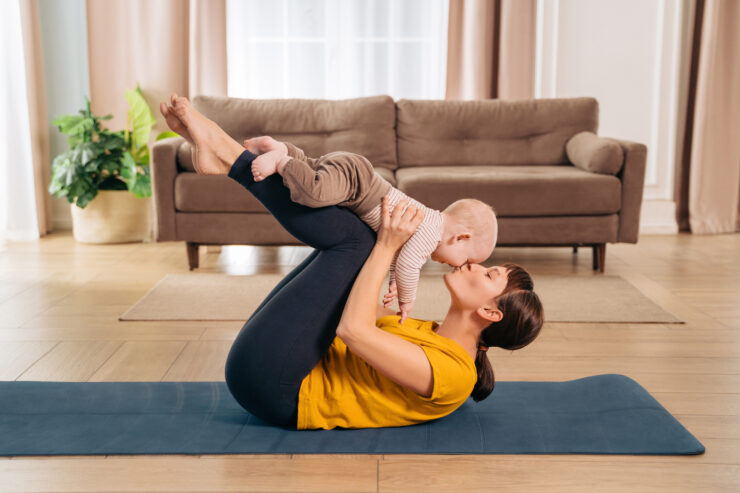A lot of work goes into the postpartum stage.
Bringing a baby into the world is a special adventure, and our bodies change a lot. But the journey doesn’t end at birth… it’s just the beginning. There are emotional and physical shifts that come postpartum, and recovery takes time and patience. While we often hear the beauty of newborn snuggles, there’s a lot of the postpartum journey that isn’t talked about enough.
Postpartum exercise specialist Lindsey Newman shared five things new moms may not expect after giving birth, and more importantly, how to navigate them with confidence.
1. Your OB-GYN Doesn’t Have All the Answers
“Postpartum is, in my opinion, one of the most unsupported times in a woman’s life,” Lindsey emphasized. Many new mothers expect their OB-GYN to guide them through recovery, but this is often not the case.
“You kind of assume that they’ll have the answers on how that should look and how it should go. But it really is not their scope of practice,” Lindsey explained. This gap leaves many mothers feeling helpless.
Lindsey has had clients describe the feeling as: “standing on the edge of a cliff side and there’s no bridge to get to the other side of fitness and regular life.”
Here are a few postpartum challenges that aren’t your OB-GYN’s specialty:
- Ab separation
- Chronic back pain
- Mental health
- Incontinence
Lindsey also mentioned there is not always an automatic referral to physical therapy, so if you feel like you need it, you should advocate for your own care.
2. Your Body May Not Go Back to Normal on Its Own
One of the most surprising aspects of postpartum recovery is that the body may not go back to normal on its own. “We bring ourselves back with a lot of intention and effort,” Lindsey pointed out. This process involves more than just picking back up pre-pregnancy activities; it requires a phased approach to rebuilding strength and mobility.
Addressing posture and alignment is an important step. Lindsey said these are things you may not even realize are changing, but your body is a kinetic chain. “It’s a full system, and we have to look at the full system for correction,” she emphasized.
When it comes to posture, Lindsey explained that you’re trying to get the ribcage and pelvis moving again after having been held in one position. “ We’re looking at full posture reformation,” she said. “We’ve lost a lot of mobility and stability. It has to be trained.”
3. The Postpartum Timeline Includes More Than a Year of Healing
Many new mothers are itching to return to their pre-pregnancy selves, but Lindsey emphasized patience. “Postpartum is a journey. It’s a process, and it definitely doesn’t end at that six-week checkup,” she said.
She explained that it can take a year or more to fully recover and feel like yourself again. This extended timeline requires giving yourself grace and understanding. “You have done a lot to get this baby here, so it’s gonna take a lot to get your body back,” Lindsey emphasized.
4. Many Moms Struggle With a Feeling of Fear
Fear is a common emotion among new mothers, especially when it comes to exercise. Lindsey noted that many moms are afraid of making things worse, so they avoid physical activity altogether. “It’s so unfortunate that there is a little bit of a fear culture around postpartum,” she said.
Lindsey stressed that you do want to be careful, but “it’s healthy stress and progression that is actually going to elicit the change that we’re looking for.” The key is to approach exercise with strategy and not be afraid to challenge the body in a healthy way.
Addressing Ab Separation
Ab separation, or diastasis recti, is a common concern for postpartum mothers. “100% of moms will have ab separation at the end of pregnancy,” Lindsey noted. ”Your abs have to stretch and spread and make room for that baby, and so trying to prevent it is kind of silly.” She said it’s less about how far the abs have separated and more about how much tension you can pull to your core to protect your spine and stabilize your body.
5. Training During Pregnancy Leads to a Fluid Postpartum Experience
“If I could do anything different, it would be to train smarter during pregnancy,” Lindsey emphasized. Training during pregnancy can set the stage for a smoother postpartum experience.
Lindsey said she wouldn’t just try to do everything in spite of being pregnant, but “train for the sport of pregnancy and for delivery and for recovery,” which includes understanding and addressing posture changes throughout the process.
Find more advice from Lindsey on Instagram @4thtrimestertraining.















Add comment